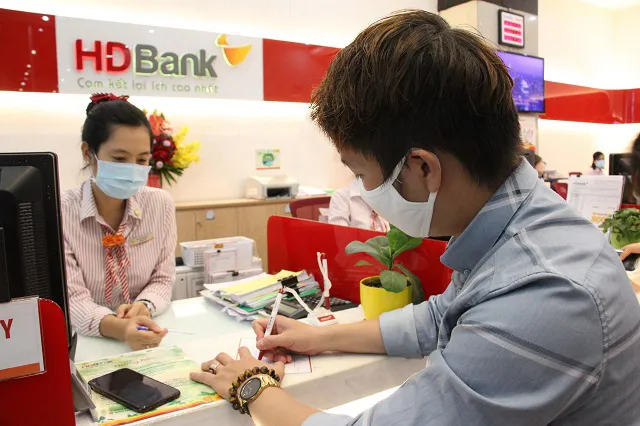Experts blasts proposal of bringing deposit interest rate to 0%
A 0% deposit rate amid a high inflation rate would turn people away from banks and look for other investment channels such as real estate, securities, or gold with higher risks, stated an expert.
The scenario of bringing the deposit interest rate to 0% as proposed by the Vietnam Association of Finance Investors (VAFI) is impractical and causes risks for the economy when the inflation rate is high, local economists have said.
The VAFI previously argued that Vietnam’s current short- and medium-term deposit interest rates at 3.5-6.2% per annum remain high compared to the 0% rate offered by neighboring countries such as Thailand, the Philippines, Malaysia, or Singapore, which lead to high lending rates for both enterprises and individual customers.
| A customer at HD Bank - Hanoi branch. Photo: Viet Linh |
“A 0% deposit rate in this case, thus, would ensure low lending rates [2-5%], in turn further supporting the development of the business community and stock market, along with protecting social welfare for low-income group,” it noted.
Economist Can Van Luc, however, said that a comparison of nominal interest rates is inaccurate given the higher risk of Vietnam compared to regional peers.
For example, Vietnam is given a BB sovereign rating by S&P, while those of Indonesia and the Philippines are BBB, Thailand (BBB+), Malaysia (A-), China (A+), South Korea (AA), and Singapore (AAA).
“From an economy-finance perspective, the higher risk would require higher interest rate,” Luc said, adding Vietnamese enterprises seeking dollar-denominated loans would be subject to an interest rate of 3-6% per annum, depending on the terms and risk level.
Another point needed to take into consideration is the higher inflation rate in Vietnam compared to other countries. This year, Vietnam’s inflation rate is estimated at 3.5%, higher than the global average of 2.8%, China (1.8%), and ASEAN-4 (2%).
“By depositing money into the bank, people would expect the interest rate to be higher than the inflation,” he added.
On the contrary, a 0% deposit rate amid a high inflation rate would turn people away from banks and look for other investment channels such as real estate, securities, or gold with higher risks, Luc suggested. In that case, the banking sector would face a lack of liquidity and unable to meet the credit demand of the economy.
“This is significant as credit supply currently contributes to 50% of total investment capital, followed by the stock market [20%], while FDI, public and private investments make up the rest,” Luc estimated.
Sharing the same view, Nguyen Duc Do, deputy director of the Institute of Economics and Finance, told The Hanoi Times that for the public, depositing money at banks remains the safest option.
“At an inflation rate of 2.9% in May, customers would face a negative interest rate if banks adopt a 0% deposit rate,” Do noted.
Banking expert Nguyen Tri Hieu told The Hanoi Times that “people would rush to withdraw money from banks in that case, causing a severe consequence to the economy.”
According to Hieu, countries that offering 0% deposit rates have to ensure two factors which are low inflation rate and the non-reliance of the banking sector on capital mobilized from the public.
“Lacking those two factors mean it is impossible to take the deposit rate to 0%,” Hieu concluded.













